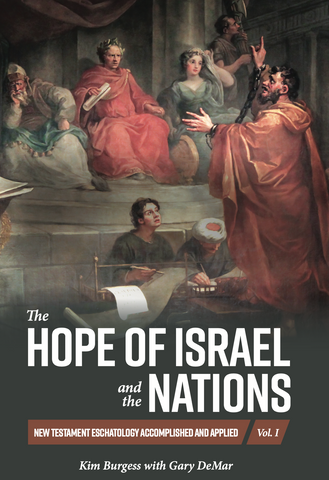Gary responds to a podcast episode where a biblical scholar reinterprets Paul as being purely “heavenly-minded.”
Old Testament Israel was Yahweh’s chosen means to bring salvation to the Gentile nations of the world. Not understanding this principle gets us off track. People think that eschatology, because of the influence of the historic creeds of the Church and of the various systematic theologies, is only about the “end of time” in world history. It is not. In the most foundational sense in the Bible, Biblical eschatology is about OT Israel, and especially about the consummation of Israel’s history of redemption that led from the call of, and the promises made to, Abraham on to the person and work of Christ together with the consequences that all this redemptive history had for world history and its own subsequent consummation. As we have already seen in previous Episodes, Israel’s eschatology was dealing with the objective and the covenantal in the sense of redemption accomplished as that is then “worked out” in the world among the Gentile nations by way of redemption applied.
But in dealing with the Old Testament, we can’t start with Israel in the middle of nowhere. What was Israel brought into being through Abraham’s seed to do? Israel was brought into being to deal with the serious problem that Adam introduced into the world. What was this Adamic problem? In Romans 5:12-19, Paul spelled it out for us. It was the problem of “sin, condemnation, and death” that came into the world because of Adam’s fall and affected all of humanity. His sin affected the whole of creation and the whole of what we call world history from that point onward in space and time (Romans 5:12-19).
Since God intended to overcome the Adamic problem of sin and death, the next question for us must be: Why did things not move straight to Abraham after Adam’s fall to get busy with the historical process of bringing redemption to the world? The fall is covered in Genesis 3, but we do not get to Abraham until Genesis 12. What was going on between Genesis 3 and 6 where we find the threat of the coming flood? Where did things go between the fall and the flood? We should interject here that the flip side to eschatology is protology, the branch of theology pertaining to origins and first things. We are not going to understand anything else if we do not first understand Genesis.

The Hope of Israel and the Nations
The reader and student of the Bible must first understand the content of the New Testament writings in terms of how those in the first century would have understood it. The New Testament is written against the background of the Old Testament. The shadows of the Old were fulfilled in the reality of the New. All the rituals and ceremonies were fulfilled in Jesus. The same is true of the temple, land, blood sacrifices, the nature of redemption, the resurrection of the dead, the breaking down of the dividing wall dividing Jews and Gentiles, and so much more. The New Testament's emphasis is on the finished work of Jesus and its application, not only to that Apostolic generation but to the world today.
Buy NowGary responds to a podcast episode where a biblical scholar reinterprets Paul as being purely “heavenly-minded.” Claiming that Paul was convinced that a major eschatological event was in his future (especially in 1 Corinthians 7), the scholar believes that 1) Paul was mistaken, and 2) he was more concerned with spiritual realities than physical conditions in the first century anyway.

